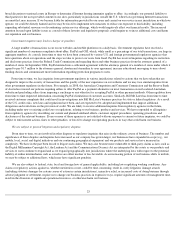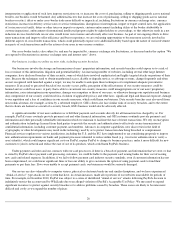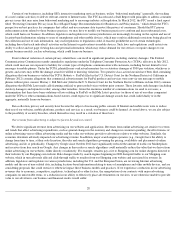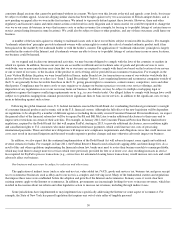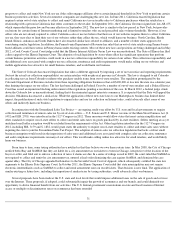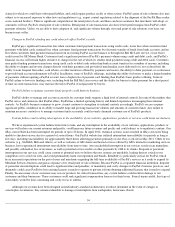eBay 2012 Annual Report Download - page 33
Download and view the complete annual report
Please find page 33 of the 2012 eBay annual report below. You can navigate through the pages in the report by either clicking on the pages listed below, or by using the keyword search tool below to find specific information within the annual report.
property to collect and remit New York use tax if the seller engages affiliates above certain financial thresholds in New York to perform certain
business promotion activities. Several ecommerce companies are challenging this new law. In June 2011, California enacted legislation that
required certain out-of-state retailers to collect and remit California use tax on taxable sales to California purchasers when the retailer has a
relationship with a person in California that refers customers to the retailer. In September 2011, the California Governor signed into law AB 155,
which superseded the prior law and became effective in September 2012. The new law is similar to the law passed in New York, but provides
exclusions for certain forms of Internet marketing and is limited to retailers who exceed prescribed sales volume thresholds. However, if our
sellers who are not already required to collect California sales or use tax believe that their use of our websites requires them to collect California
use tax, they may elect to limit their use of our websites rather than collect the tax, which would harm our business. North Carolina, Rhode
Island, Illinois, Arkansas and South Dakota have also enacted similar laws related to affiliates, and a number of other states appear to be
considering similar legislation. In addition, the Pennsylvania Department of Revenue has ruled that an out-of-state retailer using Pennsylvania-
based affiliates could have nexus in Pennsylvania under existing statutes. Most of these new laws and positions are being challenged and in May
2012, a Cook County Circuit Court judge ruled that the Illinois Internet Affiliate Nexus Law was unconstitutional. The State of Illinois has filed
a direct appeal to the Illinois Supreme Court. The adoption of such legislation by states where eBay has significant operations that perform
certain business promotion activities could result in a use tax collection responsibility for certain of our sellers. This collection responsibility and
the additional costs associated with complex use tax collection, remittance and audit requirements would make selling on our websites and
mobile applications less attractive for small business retailers, and would harm our business.
The State of Colorado has enacted legislation that takes a different approach by imposing a set of use tax notice and reporting requirements
(but not the actual tax collection responsibility) on certain retailers with no physical presence in Colorado. The law is designed to aid Colorado
in collecting use tax from Colorado residents who purchase taxable items from out-of-state retailers. The regulation promulgated by the
Colorado Department of Revenue excludes from these reporting obligations businesses that sell $100,000 or less into the state in a calendar year,
thus limiting the impact on our sellers. The law has been challenged in Federal Court by a number of out-of-state retailers and a Federal District
Court has issued an injunction blocking enforcement of the regulations pending a resolution of the case. In March 2012, a federal judge struck
down the Colorado law as unconstitutional, finding that it discriminated against interstate commerce. It is expected that the State will appeal the
decision. Oklahoma has enacted a similar law. While the application of these new state laws to our Marketplaces business has limited direct
impact, the proliferation of such state legislation to expand sales and use tax collection on Internet sales, could adversely affect some of our
sellers and indirectly harm our business.
In conjunction with the Streamlined Sales Tax Project — an ongoing, multi-year effort by U.S. state and local governments to require
collection and remittance of remote sales tax by out-of-state sellers — U.S. Senate and U.S. House versions of the Main Street Fairness Act (S.
1452 and H.R. 2701) were introduced in the 112
th
Congress in 2012. These measures would allow states that meet certain simplification and
other standards to require out-of-state sellers to collect and remit sales taxes on goods purchased by in-state residents. Sellers meeting an as yet
undefined small seller exception would be excluded from the requirements of the Act. Other legislation introduced in the 112
th
Congress in
2012, including H.R. 3179 and S. 1832, would grant states the authority to require out-of-state retailers to collect and remit sales taxes without
requiring the state to join the Streamlined Sales Tax Project. The adoption of remote sales tax collection legislation that lacks a robust small
business exemption would result in the imposition of sales taxes and additional costs associated with complex sales tax collection, remittance
and audit compliance requirements on many of our sellers. This would make selling online less attractive for small retailers, and would likely
harm our business.
From time to time, some taxing authorities have notified us that they believe we owe them certain taxes. In May 2008, the City of Chicago
notified both eBay and StubHub that they are liable for a city amusement tax on tickets to events in Chicago, irrespective of the location of the
buyer or seller, and filed suit to enforce collection of taxes it claims are due. In a series of rulings issued in 2009, the court ruled that StubHub is
not required to collect and remit the city amusement tax, entered a final order dismissing the case against StubHub, and dismissed the case
against eBay. The City of Chicago appealed both matters to the Seventh Circuit Court of Appeals, which subsequently certified the state law
arguments to the Illinois State Supreme Court. In October 2011, the Illinois Supreme Court ruled that state municipalities may not require
electronic intermediaries such as StubHub to collect and remit amusement taxes on resold tickets. That decision is now final. The application of
similar existing or future laws, including the imposition of similar taxes by taxing authorities, could adversely affect our business.
Several proposals have been made at the U.S. state and local levels that would impose additional taxes on the sale of goods and services
over the Internet. These proposals, if adopted, could substantially impair the growth of ecommerce and our brands, and could diminish our
opportunity to derive financial benefit from our activities. The U.S. federal government's moratorium on state and local taxation of Internet
access or multiple or discriminatory taxes on ecommerce has been extended
31




